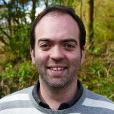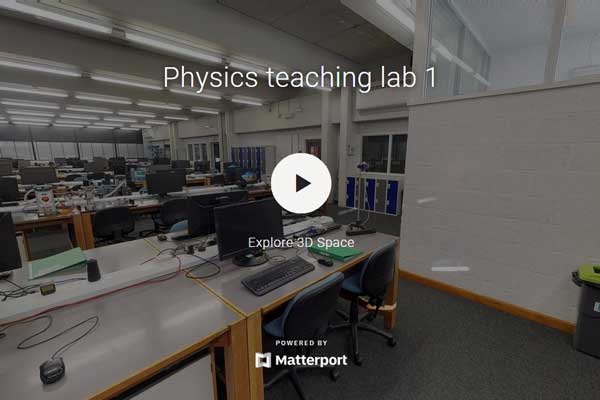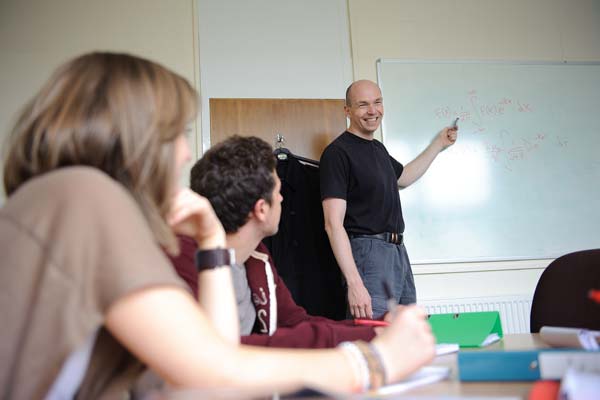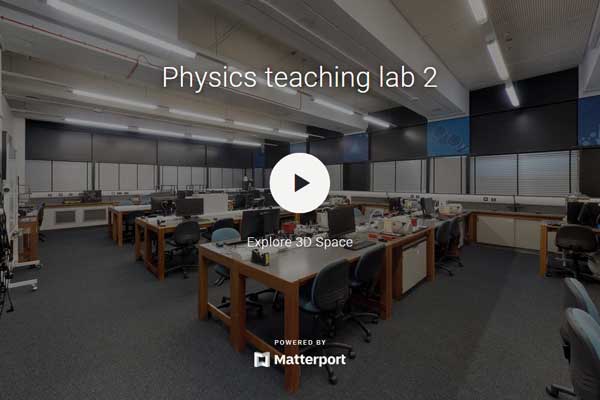View semester dates

BSc (Hons) Physics with Philosophy
Follow in the footsteps of philosopher-scientists from Aristotle to Bertrand Russell and tackle some of the fundamental questions of life, the universe and everything.
Year of entry: 2026/27
View semester dates
Get an insight into the minds of the great thinkers, where the works of Newton and Einstein stand alongside those of Plato and Kant.
Critically evaluate scientific methods and see physics laid bare. Study topics from plasma to paradox and discover fundamental truths about the nature of the Universe.
You'll study the foundations of physics, enhanced by the grand theories of metaphysics, ethics and logic. You'll learn to analyse real-life problems and communicate complex ideas and arguments - key skills for your onward career.
You'll work with world-renowned physicists and philosophers, probing the nature of existence and pushing the boundaries of research.
Accreditation
Take a virtual tour of one or our modern, dedicated laboratories showing a typical range of lab equipment and facilities that you'll use.Physics lab virtual tour

The variety of optional modules meant I could tailor my degree to match my interests, and the supportive academic environment made challenging topics feel achievable. The community in the Physics department is amazing. The final-year projects let you dive into real research, with supportive supervisors who treat you like a junior scientist.
Course content
This course offers a good all-round study of physics set in the context of wider human knowledge. You'll gain a complete and thorough grounding in physics, from scientific principles to applied experimentation.
In your philosophy modules you'll go beyond the philosophy of science and study the entire history of thought. You'll develop knowledge of the great thinkers of antiquity, different strands of world philosophy and modern perspectives.
In your final year you'll work with a group on an original research project. You'll work under guidance from an academic supervisor to bring new knowledge and deeper understanding to a topic like quantum mechanics or nuclear physics, or a concept such as truth or time.
Year 1
Year 1 emphasises core material to consolidate your existing knowledge and prepare you for more advanced study. You'll cover key concepts in physics and gain essential mathematical skills. In philosophy, you'll develop your powers of reasoning and argument, challenging your opinions and forming your approach to the bigger philosophical questions.
Core modules
- Classical and Quantum Waves
- Mathematical, Computational and Professional Skills 1
- Knowledge and Perception
- Electromagnetism and Relativity
- Mathematical, Computational and Professional Skills 2
- Logic
Academic integrity module
In addition to the above you will also need to complete our online Academic Integrity module.
Year 2
In Year 2 you'll deepen your understanding of fundamental physical laws and processes. You'll explore in-depth issues in central philosophy and learn to approach problems creatively.
Core modules
- Thermodynamics and Electromagnetism
- Mathematics, Professional Skills and Introduction to Laboratories
- Statistical and Solid State Physics
- Quantum, Atomic, Nuclear and Particle Physics
- Philosophy of Science
Option modules
You will study one Philosophy option module. Examples can be found below. Some option module combinations may not be possible. The options available to you will be confirmed after you begin your course.
- Aesthetics
- Applied Ethics
- Being and Reason
- Knowledge and Social Sciences
- Logic and Paradox
- Love, Law, and Solidarity: Recognition from Rousseau to Honneth
- Politics and Freedom: Anarchism and Conservatism
- Religious Ethics
- The Limits of Reason: Kant’s Theoretical and Practical Philosophy
Elective modules
You may be able to replace one option module with an elective module, studying a complementary subject, a language or an interdisciplinary topic.
Year 3
Year 3 introduces some advanced concepts, building on the expertise you've developed. Optional modules give you the chance to delve deeper into your favourite philosophical topic, or discover a new area of physics.
You'll work on a group project to investigate a current problem in philosophy or physics. You can choose to take an interdisciplinary approach, deconstructing scientific and philosophical theories. Alternatively, join one of our internationally-renowned research groups and investigate a problem in physics. You'll conduct original research to reach new conclusions and, at the highest levels, contribute to our understanding of the world.
Core modules
- BSc Research Project and Skills
- Philosophy of Physics
- Classical Mechanics and Advanced Laboratories for Physics with Philosophy
The BSc Project gives you the chance to design and carry out an extended scientific investigation. You'll join a small group looking at a project which will require creativity and original thinking to tackle. Each project is supervised by a specific member of staff with relevant expertise, who can give advice and assistance.
Recent projects have included:
- Can Closed Time-like Curves Exist?
- Dark Energy and the Cosmological Constant
- The Many-Worlds Interpretation of Quantum Physics and How It Solves Problems for Relativity Theory
You'll be supported by a professional skills module, building on the expertise developed in Years 1 and 2. You'll work with a team to develop a talk and academic poster to be given at a conference at the end of the year.
Option modules
You will study three option modules. Examples can be found below. Some option module combinations may not be possible. The options available to you will be confirmed after you begin your course.
- Condensed Matter Physics: Electrons in Solids
- Relativity and Cosmology
- Nuclear and Particle
- Quantum Science and Technologies
- Philosophy of Physics
- Mind and Morality
- Contemporary Issues in Bioethics
- Causation and Laws
- Experimental Philosophy: The Philosophy of Psychology
- World and Mind
- Buddhism as Philosophy
- Philosophy of Christianity
- Foundations of Mathematics
- Consciousness
- Theories of Social Justice
- Cognitive Anomalies, Decision-Making, and Democracy
- Nine Art Works, Nine Philosophical Problems
- Property and Self-Ownership
- The Nature of Time
- Action and Agency
- Topics in Feminist Philosophy
- Happiness, Utility and Wellbeing
- German Idealism: Moral, Legal & Political Philosophy
- Introduction to Clinical Engineering and Physiological Systems
- Scientific Supercomputing
Elective modules
You may be able to replace one option module with an elective module, studying a complementary subject, a language or an interdisciplinary topic.
Our modules may change to reflect the latest academic thinking and expertise of our staff, and in line with Department/School academic planning.
Learning outcomes
Every course at York has been designed to provide clear and ambitious learning outcomes. These learning outcomes give you an understanding of what you will be able to do at the end of the course. We develop each course by designing modules that grow your abilities towards the learning outcomes and help you to explain what you can offer to employers. Find out more about our approach to teaching and learning.
Learning outcomes for this course
- Apply the techniques and results of physics and mathematics to independently solve complex problems, using core physics, mathematics and/or computational knowledge.
- Apply the principles of physics to construct and execute a scientific investigation to evaluate a hypothesis and interpret the results.
- Recognise and define key problems, issues, and debates across a range of areas of philosophy - including some at the forefront of contemporary work - and apply their understanding in approaching new problems.
- Develop and articulate solutions to problems and puzzles in philosophy, lay out what can be said for and against these solutions, and make a measured judgement about what is the best solution in each case, supporting that judgement with a sustained line of argument based on the considerations raised.
- Communicate complex and difficult ideas in clear, precise, and accessible terms to the general public and professional scientists and philosophers in a variety of formats.
- Collaborate effectively with others, and work with a group to apply physics themes and concepts to open-ended problems.
- Critically evaluate scientific methods and theories from a philosophical viewpoint, and critically evaluate philosophical views and theories in the light of the findings of modern physics.
- Engage with a range of physical and philosophical theories, and the connections between them, in order to appreciate the intellectual beauty and societal applications of physics and philosophy, and be inspired to lifelong learning.
Fees and funding
The fees and funding information here is for students starting in the 2026/27 academic year.
If you take a year abroad or year in industry you'll pay a reduced rate of fees for that year.
Annual tuition fees
| UK (home) | International and EU |
|---|---|
| £9,535 (TBC) | £32,350 |
The UK government has announced its intention to increase tuition fees from £9,535 to £9,790 for the 2026/27 academic year. We expect this to apply to new UK (home) undergraduate students starting their studies in September 2026.
UK (home) or international fees?
The level of fee that you will be asked to pay depends on whether you're classed as a UK (home) or international student. Check your fee status.
Fees for subsequent years
- UK (home) fees may increase within the government fee cap in subsequent academic years. We will notify you of any increase as soon as we can.
- International fees are subject to increase in subsequent years in line with the prevailing Consumer Price Index (CPI) inflation rate (up to a maximum of 10%).
More information
For more information about tuition fees, any reduced fees for study abroad and work placement years, scholarships, tuition fee loans, maintenance loans and living costs see undergraduate fees and funding.
Additional costs
You will need to cover transportation costs to/from any placement during a year in industry as well as living costs while on placement. You should be able to cover the majority of expenses with salary earned during the placement.
You will need to cover transportation costs to/from any placement during a year abroad. You may be eligible for extra loans and/or grants through your student loan provider dependent on your financial background.
Funding
We'll confirm more funding opportunities for students joining us in 2026/27 throughout the year.
- UK government loans
- UK scholarships and bursaries
- International scholarships
- Country-specific funding
- US loans
Masterclass Research Placements
Any student who enters stage 1 of any of our physics degrees having achieved an A* at A level (or equivalent) in Mathematics or Physics and achieves an overall Year Mark of 70 per cent or higher in stage 1 in their first attempt is guaranteed a Masterclass Research Placement.
In addition, a number of Masterclass places will be made available to students who did not qualify based on entry qualification, but who achieve an overall Year Mark of 70 per cent or higher in stage 1 in their first attempt and have demonstrated significant improvement in their abilities during their first year of study.

I chose to study Physics as it enables me to understand the world’s fundamental workings. I enjoy applying my knowledge to diverse physical situations. It’s a subject where there’s always something new to learn. It keeps you on your toes and offers a wealth of transferable skills that can be utilised in a future career!
York, Oxford, Cambridge, Imperial
Just four UK universities are rated Gold for teaching and top ten for research* in the latest national assessment exercises.
* Awarded joint 10th in the Times Higher Education ranking of the Research Excellence Framework 2021.
Teaching and assessment
You’ll study and learn with academics who are active researchers, experts in their field and have a passion for their subjects. Our approach to teaching will provide you with the knowledge, opportunities, and support you need to grow and succeed in a global workplace. Find out more about our approach to teaching and learning.
Teaching format
Much of your teaching will be in the form of lectures based on our cutting-edge research. You will regularly join other students for small group discussions of course material with a tutor. Discussions often range beyond the immediate subject matter to wider implications and issues.
You'll have regular meetings with a personal academic supervisor, who will guide your studies and keep an eye on your academic progress and general welfare.
Timetabled activities
In your first year, you can expect:
| Lectures | 5-12 hours per week |
|---|---|
| Seminars | 2-6 hours per week |
| Practicals | 2-6 hours per week |
These figures are representative of a typical week. Your contact hours will vary throughout the year due to your module choices, non-compulsory classes, exam periods and changes to scheduled activities.
Outside your timetabled hours, you'll study independently. This may include preparation for classes, follow-up work, wider reading, practice completion of assessment tasks, or revision.
In the UK, full-time students are expected to spend 1,200 hours a year learning. That's about 40 hours of classes and independent study each week during semesters. Everyone learns at a different rate, so the number of hours you spend on independent study will be different to other students on your course.
Teaching location
You'll be based in the School of Physics, Engineering & Technology on Campus West. Most of your teaching will take place in the School, with some classes in the Department of Philosophy and elsewhere on Campus West.
About our campus
Our beautiful green campus offers a student-friendly setting in which to live and study, within easy reach of the action in the city centre. It's easy to get around - everything is within walking or pedalling distance, or you can use the fast and frequent bus service. Take a campus tour.
Assessment and feedback
Throughout your degree you will be assessed through a variety of methods. You'll also be marked on regular problem exercises and laboratory work, coursework and formal report writing.
Your Research Project makes up a large proportion of mark for your final year. You'll be assessed on your lab work and dissertation, and face an oral examination: all great preparation for continuing your studies to PhD level.
We balance various types of assessment to develop and test your different strengths:
- Examinations
- Extended assignments
- Weekly practice questions
- Formal reports
- Presentations
You'll get prompt, regular feedback to help you develop your skills. Our open door policy means you can always approach your tutors if you want to discuss your work.
Careers and skills
Our graduates are sought by employers in a huge range of disciplines. The skills you will learn - analysis, mathematics, problem-solving - are relevant in industries from finance to software development. This is supported by a central careers service, but also within the school through our contacts with industry. Alternatively, many of our graduates progress to postgraduate degrees at York and other leading universities.
We're committed to supporting our students' career development and employability - it's embedded in our core teaching. We organise activities from careers fairs to leadership building exercises to ensure you're prepared to enter the jobs market with a competitive edge.
Companies that York physics graduates have gone on to work for include: BAE Systems, E.ON, De Vere, The Home Office, Jaguar Land Rover, John Lewis, the Science and Technology Council, and Virgin Money.
Career opportunities
Our graduates are working as:
- accelerator physicist
- engineer
- scientist
- financial coordinator
- IT analyst and consultant
- teacher
- electrical engineer
- environmental modeller
- accountant
Transferable skills
- Self-management
- Communication skills
- Team working
- Problem solving
- Creativity and innovation
- IT literacy
- Mathematics
Entry requirements
| Qualification | Typical offer |
|---|---|
| A levels | AAB including Physics and Mathematics. |
| European Baccalaureate | 80% overall, with 85% in Physics and Mathematics |
| International Baccalaureate | 35 points overall, including 5 in Higher Level Mathematics (either Analysis and Approaches or Applications and Interpretations) or 6 in Standard Level Mathematics (Analysis and Approaches), plus 5 in Higher Level Physics. |
| T levels | We are currently not accepting T Levels for this course unless additional A Level (or equivalent qualifications) in Mathematics and Physics have been taken. |
| Scottish Highers / Advanced Highers | Advanced Highers - BB in Physics and Mathematics plus Scottish Highers - BB We may also be able to consider three Advanced Highers or a combination of Highers and Advanced Highers, where an applicant does not meet the grade requirement through Highers alone. Please contact us to discuss your qualifications. |
| International foundation programme | Foundation Certificate from our International Pathway College or an appropriate alternative. |
| Other qualifications | All other qualifications, including Scottish Highers and Irish Leaving Certificates, will be considered individually. If you don't have suitable qualifications in Maths and/or Physics, successfully completing a Foundation Year will guarantee a place on any of our undergraduate degrees: Physics (with a foundation year) (BSc) We welcome applications from mature students and students without standard qualifications. Please contact our admissions team to discuss your specific circumstances. |
| Other international qualifications | Equivalent qualifications from your country |
Alternative offers
Meeting the following additional criteria may qualify you for an alternative offer.
| Criteria | Adjustment |
|---|---|
| Widening participation | BBC including B in Mathematics and Physics This is conditional upon successful completion of the WP programme including the YorJourney module (Black Access Programme, Next Step York) or successful completion of Realising Opportunities More about widening participation. |
| Contextual offer | BBB including Physics and Mathematics. |
| EPQ | If you achieve C or higher in the EPQ, you may be eligible for an alternative offer up to one A level grade (or equivalent) below our typical offer. |
| The York Tutorial Programme | If you successfully complete the York Tutorial Programme, you may be eligible for an alternative offer up to one A level grade (or equivalent) below your offer. |
English language
If English isn't your first language you may need to provide evidence of your English language ability. We accept the following qualifications:
| Qualification | Minimum requirement |
|---|---|
| IELTS (Academic) | 6.5, with a minimum of 6.0 in each component |
| IB English | A score of 4 in English A or 5 in English B (Higher Level or Standard Level) |
| Cambridge CEFR | 176, with a minimum of 169 in each component |
| Oxford ELLT | 7, with a minimum of 6 in each component |
| Oxford Test of English Advanced | 136, with a minimum of 126 in each component |
| Duolingo | Integrated subscores: 120 overall, with a minimum of 105 in each component |
| GCSE/IGCSE/O level English Language (as a first or second language) | Grade C / Grade 4 |
| LanguageCert SELT | B2 with a minimum score of 33/50 in each component |
| LanguageCert Academic | B2 with a minimum score of 33/50 in each component |
| Kaplan Test of English Language | 478 Main Flight score with 444 in each component |
| Skills for English | B2: Merit overall, with Pass with Merit in each component |
| PTE Academic | 61, with a minimum of 55 in each component |
| TOEFL | 87 overall, with a minimum of 21 in each component (taken before January 2026) 4.5 with 5 in Listening and 4.5 in each other component (taken after January 2026) |
| Trinity ISE III | Merit in all components |
| Other English language qualifications | We also accept other English Language qualifications, including various school-leaving certificates. |
For more information see our undergraduate English language requirements.
If you haven't met our English language requirements
You may be eligible for one of our pre-sessional English language courses. These courses will provide you with the level of English needed to meet the conditions of your offer.
The length of course you need to take depends on your current English language test scores and how much you need to improve to reach our English language requirements.
After you've accepted your offer to study at York, we'll confirm which pre-sessional course you should apply to via You@York.
Next steps
Contact us
Get in touch if you have any questions

Discover York









